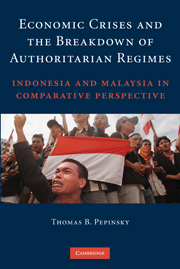 Economic Crises and the Breakdown of Authoritarian Regimes
Economic Crises and the Breakdown of Authoritarian Regimes Published online by Cambridge University Press: 21 January 2010
Malaysians often remarked during the early months of 1998 that every time Prime Minister Mahathir Mohamad opened his mouth, the ringgit depreciated. It was not hard to see why. As the Kuala Lumpur Stock Exchange (KLSE) tumbled and the ringgit depreciated, Mahathir's public demeanor ranged from defiant to vitriolic. He blamed Malaysia's currency and financial crisis on hostile “rogue” factions from George Soros to Western colonialists to the International Monetary Fund to a global Jewish conspiracy. In contrast to the positive reviews of Soeharto's crisis management in the first months of Indonesia's crisis, Mahathir's outbursts earned him condemnation from the foreign investment community. Confronted with what seemed to be an increasingly unhinged autocrat, foreign observers lambasted Mahathir for ignoring his regime's own failures in macroeconomic planning, and for downplaying the policy mismanagement that became ever more apparent as foreign investors took a second look at Malaysia.
Mahathir's public persona hid the regime's struggles over adjustment policy. The government's initial steps were actually encouraging from the IMF's perspective and included a vow to eliminate wasteful public expenditures and pledges of fiscal discipline by Anwar Ibrahim. In his words, these adjustment measures amounted to “IMF without the IMF.” Yet the regime's commitment to IMF-style policies was short-lived. Interest rate hikes to encourage capital inflows were temporary and not nearly as sharp as those in other crisis countries. The regime restarted many of the postponed infrastructure projects, using the logic of “strategic investment” to excuse what were clearly uneconomic ventures.
To save this book to your Kindle, first ensure no-reply@cambridge.org is added to your Approved Personal Document E-mail List under your Personal Document Settings on the Manage Your Content and Devices page of your Amazon account. Then enter the ‘name’ part of your Kindle email address below. Find out more about saving to your Kindle.
Note you can select to save to either the @free.kindle.com or @kindle.com variations. ‘@free.kindle.com’ emails are free but can only be saved to your device when it is connected to wi-fi. ‘@kindle.com’ emails can be delivered even when you are not connected to wi-fi, but note that service fees apply.
Find out more about the Kindle Personal Document Service.
To save content items to your account, please confirm that you agree to abide by our usage policies. If this is the first time you use this feature, you will be asked to authorise Cambridge Core to connect with your account. Find out more about saving content to Dropbox.
To save content items to your account, please confirm that you agree to abide by our usage policies. If this is the first time you use this feature, you will be asked to authorise Cambridge Core to connect with your account. Find out more about saving content to Google Drive.